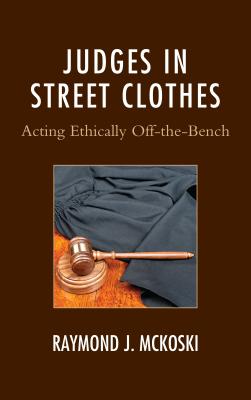Judges in Street Clothes provides an historical, theoretical, and practical analysis of the ethical restrictions placed on the public lives of judges. The State’s interest in maintaining an independent and impartial judiciary is considered against a judge’s right to engage in educational, religious, charitable, civic, and professional activities.
To maintain public confidence in the judiciary, judges are governed by the strictest of ethical codes. Codes of conduct not only circumscribe a judge’s official conduct but also restrict every aspect of a judge’s off-bench life. Judges in Street Clothes: Acting Ethically Off-the-Bench provides an in-depth analysis of the rules limiting the charitable, educational, religious, fraternal, civic, and law-related extrajudicial activities of state and federal judges. This comprehensive, heavily footnoted resource examines: (1) the historical development of the American Bar Association’s four model judicial codes with an emphasis on the rules regulating the charitable, educational, religious, fraternal, civic, and law-related activities of judges; (2) the State’s interests in restricting the extrajudicial activities of judges; (3) the strengths and weaknesses of rules governing a judge’s off-bench activities; (4) how state and federal courts, judicial disciplinary commissions, and judicial ethics advisory committees have interpreted judicial conduct rules; (5) best practices for judges; and (6) the constitutionality of the restrictions on a judge’s charitable, educational, religious, fraternal, civic, and law-related undertakings.From both a theoretical and practical standpoint, this book addresses the ethical implications of the everyday activities of judges. How far may a judge go in expressing personal opinions about social and legal issues? What are the limits on a judge’s use of social media? Is it permissible for a judge to receive an award from a victim advocacy group? Do the rules permit a judge to speak at a church or bar association’s fund-raising dinner? May judges teach prosecutors and law enforcement officials how to improve their job performance? May a judge appear in an informational video for the judge’s alma mater? Former judge Raymond J. McKoski discusses these and a host of other everyday situations judges face in their attempts to remain involved community members while promoting public confidence in the independence, integrity, and impartiality of the judiciary.
Get Judges in Street Clothes by at the best price and quality guranteed only at Werezi Africa largest book ecommerce store. The book was published by Fairleigh Dickinson University Press and it has pages. Enjoy Shopping Best Offers & Deals on books Online from Werezi - Receive at your doorstep - Fast Delivery - Secure mode of Payment
 Jacket, Women
Jacket, Women
 Woolend Jacket
Woolend Jacket
 Western denim
Western denim
 Mini Dresss
Mini Dresss
 Jacket, Women
Jacket, Women
 Woolend Jacket
Woolend Jacket
 Western denim
Western denim
 Mini Dresss
Mini Dresss
 Jacket, Women
Jacket, Women
 Woolend Jacket
Woolend Jacket
 Western denim
Western denim
 Mini Dresss
Mini Dresss
 Jacket, Women
Jacket, Women
 Woolend Jacket
Woolend Jacket
 Western denim
Western denim
 Mini Dresss
Mini Dresss
 Jacket, Women
Jacket, Women
 Woolend Jacket
Woolend Jacket
 Western denim
Western denim
 Mini Dresss
Mini Dresss






























































